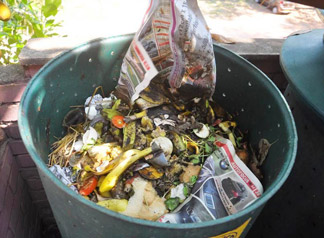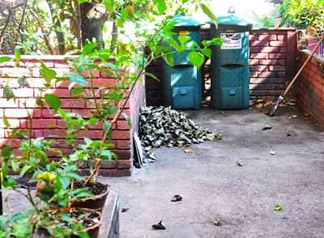|
Garbage disposal:
Compost bins to the rescue
By Ranil Wijayapala
Maintaining the Colombo city, the commercial capital of the country,
as a clean city was considered an arduous task for the city fathers
handling the garbage problem a few years ago considering the 700 to 800
tonnes of garbage, daily collected from the Colombo Municipal Council
limits in the absence of a major solid waste handling projects and also
garbage dumping sites to dump the garbage daily collected from the city.
 |
 |
 |
| Major Niroshan
Perera |
N. Rupasinghe |
Sandeepa Sewmini |
Therefore, there is no argument that garbage has become an issue that
has to be addressed in a step by step process, by getting the support of
the people for the garbage handling process and also by introducing
innovative and simple methods for the people to reduce the generation of
garbage at household level.
We are aware that many steps have been taken by the city
administration along with the Defence and Urban Development Ministry to
educate the people towards the garbage handling process and streamline
those processes, but there is no major shift in the attitude of the
people towards these projects as many of the projects die a natural
death before they become national level programs. Therefore, there is an
urgent necessity to have programs to get the support of the general
public towards this issue as it is now propelling into a national level
issue.
Except for the huge garbage generation points such as markets and
other public places, the households in the city are primarily
responsible for the generation of garbage in the Colombo city limits.
If proper mechanisms are put in place to reduce the amount of garbage
that goes to the Municipal garbage trucks at household level that will
definitely be a positive factor towards solving the problem of garbage
in the Colombo city limits and other cities as well.
It is natural to observe the people in the higher stratas of society
urging the common masses to follow such mechanism without setting
example from the top level for such programs. However, the Sunday
Observer came across a set of people in high positions in the government
service setting such examples to the society by reducing the amount of
garbage they add to the Municipal garbage trucks by maintaining compost
bins in their households.
Summit Flats
The Summit Flats, government officers quarters complex located in a
highly residential area has become an area which has reduced the amount
of garbage adding to the Municipal garbage trucks through the
introduction of compost bins.
 |
| Kitchen waste
in compost bin. Pix:Thilak Perera |
 |
| Compost bins
in the compund |
The Sunday Observer learned that compost bins project has become a
success in Summit Flats government officers quarters complex, as most of
the houses have been relieved from stinking garbage sacks kept in their
compounds until they are collected by the Municipal garbage trucks with
the introduction of the composting bins.
The project of introducing these compost bins has resulted due to the
instructions from the Secretary of Defence and Urban Development
Ministry after observing the successful implementation of such project
in Panagoda, Army cantonment.
Panagoda Army cantonment overcome the garbage problem under the
instructions of then Security Forces Headquarter West Major General
Sumith Manawaduge after reducing the amount of garbage collected from
the quarters complexes and other garbage generating units within the
camp. The Sunday Observer reported the success story of that project on
July 21 edition in 2013.
An approach similar to Panagoda Army cantonment waste management
project has been followed in the Summit Flats area also as Major
Niroshan Perera, who is in charge of the waste management project in
Panagoda Army cantonment has taken initiative to distribute the compost
bins around 200 residences within the Summit Flats housing scheme. Now
the project is going on successfully with the blessings of Commander,
Security Forces Headquarters (West) Major General Sumeda Perera.
Explaining the compost bins project in Summit Flats government
quarters complex Major Niroshan Perera said that after receiving
instructions from the Ministry of Defence and Urban Development to
implement such program in Summit Flats they have obtained 200 compost
bins to be distributed in those residences free of charge.
Former Western Provincial Council Minister Udaya Gammanpila has given
them 100 compost bins free of charge while Colombo Municipal Council
contributed the project by issuing another 100 compost bins at a
concessionary price of Rs.625 per bin.
"As it is difficult to gather all the residents in one place to
educate about the project we had to educate them after having house to
house visits in the scheme. We educated them how to make use of the bin
effectively when distributed those bins to the houses on July 30, 2013",
he said.
To avoid practical difficulties, they have filled four third of the
compost bin with dried leaves as some residents are facing difficulties
to collect dried leaves in their compounds. Then onwards most of the
residents used to dump the organic waste such as kitchen waste, and
other degradable waste into compost bins without putting them into the
garbage trucks.
"To avoid bad smell emanating from the bin we instructed them to have
a piece of paper over each layer of waste they put into the bin", he
said.
Major resistance to implement such compost bin project comes due to
the bad smell emanating from these bins. "If they putting the garbage
properly by having layers of papers to cover them that can be easily
avoided", Major Niroshan said.
Frequent visits by Army personnel to see whether the bins are being
properly maintained has become a factor for the success of the project.
Mrs. N. Rupasinghe a teacher by profession and a housewife living in
a quarters said that compost bin has become very useful to them. As
residents living in upstairs they are facing difficulties in finding
soil for their flower pots and the other cultivation in pots. But this
compost bin is providing them much needed organic fertilizer for their
cultivations.
"This system is very easy for us. Earlier we had to collect the waste
until the CMC garbage truck comes and collect them from our houses three
days a week. If we miss the garbage truck that becomes a huge problem
for us as there is no other way of dumping them. Now we are not facing
that difficulty as we have the compost bin in our compound", she said.
"Now we are only putting non-degradable waster such as polythene,
plastic and other waster collected from our house to the garbage truck.
All the other degradable waste we put into the compost bin", she said.
Sandeepa Sewmini, another housewife living in this quarters complex
also said that the garbage bin has reduced the number of days they are
putting the garbage to the garbage truck which come to collect garbage
three days a week.
"With the introduction of the composting bin we are putting garbage
to the truck only one or two days in a week. Only when we get excess
amount of garbage we put garbage three days a week", she said.
"This is a very useful method to dump degradable waste on our own
without waiting for the garbage truck.
If we follow the correct the procedures by having a piece piece of
paper on it there is no bad smell coming from the bin or it does not
attract flies like other garbage bins", she said.
She said due to the limited space they are having in their compounds
they may not be able to make use of the fertiliser for cultivations. But
the habits they are cultivating to separate garbage and dump them
separately will benefit them in future.
Another housewife who wished remain anonymous said that it is better
if they can give the compost produced from the bin to a project or
person collecting compost for sale or any other purpose as many of the
residents have no places to make use of the compost.
"If such mechanism is in put in place to this project it will be more
useful. Residents will also provide the compost free of charge to those
collectors", she said.
Anil Wijesinghe, CMC, Area Supervisor for the Garbage Collection in
Summit Flats area told the Sunday Observer that the compost bin project
has made a considerable reduction in garbage collection in Summit Flats
area.
"Now we are getting only non degradable waste from the households as
many of them are dumping the degradable waste into their compost bins.
This also helps us to separate the garbage at our recycling projects
also", he said.
"We used to collect 2.5 tonnes of garbage from these residences and
this amount has reduced by almost one forth of the earlier collection",
he said.
Anjalie Devaraja, Director Solid Waste Management Unit of the Colombo
Municipal Council also welcome the project as a plus contribution
towards the solid waste management of the Colombo city.
"It is necessary to have projects of this nature to reduce the amount
of garbage comes in to our dumping sites.
If we can encourage other people also for the project so this nature
we can have a drastic reduction in the daily collection of 700 to 800
tonnes of garbage from the Colombo city limits", she said. She said the
CMC has implemented projects of this nature earlier also with
partnership of many other organisations. "So we are encouraging to have
more and more projects of this nature in the future to solve the garbage
problem in the city", she said.
However, frequent monitoring of these compost bins is a must to
maintain public attention more towards the bins as it was the key factor
for the successful implementation of the project in Army cantonment in
Panagoda.
If there is proper mechanism to collect the separated polythene,
cardboard, coconut shells and glass and other e-waste at point closer to
this schemes that will provide added advantage to earn much needed funds
for the waste management.
If Panagoda Army cantonment could save large amount of funds that
could have gone to the Pradeshiya Sabha just for dumping the garbage in
their dumping sites, establishment of garbage handling units area wise
will also help reduce the amount of garbage going to the dumping sites
solving another burning issue in the country. |

